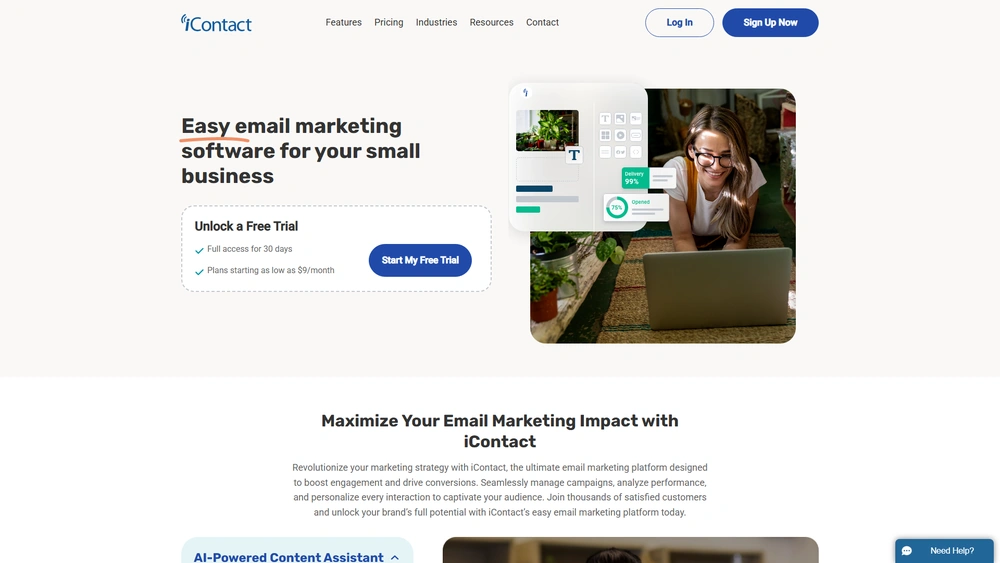iContact Overview & 2026 Industry Position
iContact is a veteran in the email marketing space, designed specifically with small to medium-sized businesses (SMBs) in mind. Since its founding, the platform has prioritized straightforward email creation tools, analytics, and automation features while remaining accessible to non-technical users. In 2026, iContact continues to carve out a niche by offering AI-guided campaign optimization, enhanced personalization, and compliance-ready outreach at highly competitive pricing. Its strategic positioning this year emphasizes support for SMB growth through intuitive automation and fast campaign turnaround.
From Launch to 2026: iContact’s Journey
Launched in 2003, iContact quickly became a preferred solution for small business owners needing an easy way to handle email marketing. In 2010, it was acquired by Vocus, leading to broader resources and expanded market presence. A few years later in 2015, iContact was returned to its entrepreneurial roots through separate ownership, allowing more agile development. Highlights of the past decade include:
- 2013: Launched A/B testing tools to improve campaign results.
- 2016: Introduced a drag-and-drop email editor for non-coders.
- 2019: Added automation workflows and triggered campaigns.
- 2022: Implemented AI-driven send-time optimization.
- 2024: Integrated SMS and multichannel options.
In 2026, iContact’s core strategy is to democratize personalized, high-performance marketing automation for time-constrained SMB teams.

iContact Key Features
iContact offers a comprehensive set of tools designed to simplify and amplify email marketing performance. Its 2025 feature set includes:
- Drag-and-drop editor: Easily build branded, responsive emails—no coding needed.
- Automation triggers: Prebuilt and customizable flows for welcome sequences, re-engagement, and more.
- AI send-time optimization: Automatically deliver emails when users are most likely to open.
- SMS marketing: Multichannel outreach via integrated SMS schedulers.
- Landing pages: Host high-conversion pages directly within the platform.
- Real-time analytics: Performance dashboards with industry benchmarks.
- Smart segmentation: Target based on behavior, location, or engagement history.
- Compliance tools: Built-in list hygiene and tools to ensure GDPR, CAN-SPAM, CCPA compliance.
Workflow & UX
iContact delivers a simplified yet highly functional user experience, especially for users less familiar with complex martech tools. Navigation is clean, with a persistent sidebar guiding users to campaigns, lists, reports, and automation. Smart templates speed up campaign creation, and contextual hints help users make the most of features without leaving the page.
Pro Tip: Use prebuilt journeys for faster automation set-up—great starting point for new marketers.
iContact Pricing Analysis & Value Metrics
As of July 2026, iContact offers three primary tiers based on list size and feature access:
| Plan | Monthly Price (1,000 contacts) | Key Inclusions |
|---|---|---|
| Essential | $14/month | Basic editor, signup forms, basic reporting |
| Pro | $30/month | Automation, segmentation, A/B testing, SMS |
| Premier | $79/month | Priority support, advanced insights, API access |
Value Summary: Competitive pricing, especially Pro tier, makes it a top value for SMBs needing advanced tools without enterprise costs.
Competitive Landscape
In the crowded email marketing scene, iContact aligns most closely with tools like Mailchimp, Constant Contact, and Moosend. Here’s a quick comparison:
| Platform | Best For | Key Differentiator | Starting Price |
|---|---|---|---|
| iContact | SMBs needing automation | Simple automation & strong deliverability | $14/mo |
| Mailchimp | Wider tool stacking | AI creative assistance & CRM | $20/mo |
| Constant Contact | Retail & event-focused businesses | Event marketing features | $12/mo |
| Moosend | SaaS & bloggers | Low-cost with advanced automation | $9/mo |
Use Cases Where iContact Shines
- E-commerce boutiques: Triggered reminders and sales-driven sequences.
- Local service providers: Appointment reminders and review requests.
- Non-profits: Donor engagement and event outreach.
- Education/startups: Onboarding transitions, progress emails, and segmented updates.
iContact Integrations
iContact connects with a growing ecosystem of business apps, including:
- CRM: Salesforce, Zoho, HubSpot
- E-commerce: Shopify, WooCommerce, BigCommerce
- Events: EventBrite, Zoom
- Payments: Stripe, PayPal
- Form builders: Jotform, Typeform
Pros & Cons
- Pro: Affordable automation for small businesses
- Pro: Intuitive email builder and workflows
- Pro: Trusted deliverability and compliance tools
- Con: Limited mobile app functionality
- Con: Lacks predictive send based on behavioral AI
- Con: Templates could use more advanced design logic
Final Thoughts
iContact remains one of the best tools in 2026 for business owners, marketers, and solopreneurs who want a no-fuss way to launch and manage email and SMS campaigns. If you’re considering platforms in the $10–$50/month range and need real automation, iContact Pro is one of the top contenders. The platform’s continual focus on usability, enhanced deliverability, and SMB-relevant integrations makes it a strong fit well into 2026.
iContact FAQ
Yes, SMS campaign tools are included in the Pro and Premier plans, with scheduling, automation, and compliance tools for U.S.-based campaigns.
Yes, iContact offers a 14-day free trial that includes automation, segmentation, and live support access.
Absolutely. iContact supports importing contacts with tags, past unsubscribes, and dormant segments to ensure compliance.
iContact offers basic contact and list management tools, or can integrate with third-party CRMs like Salesforce and HubSpot.
With dedicated IP options, list cleaning tools, and compliance filters, iContact is known for very high inbox deliverability rates, especially on business domains.

